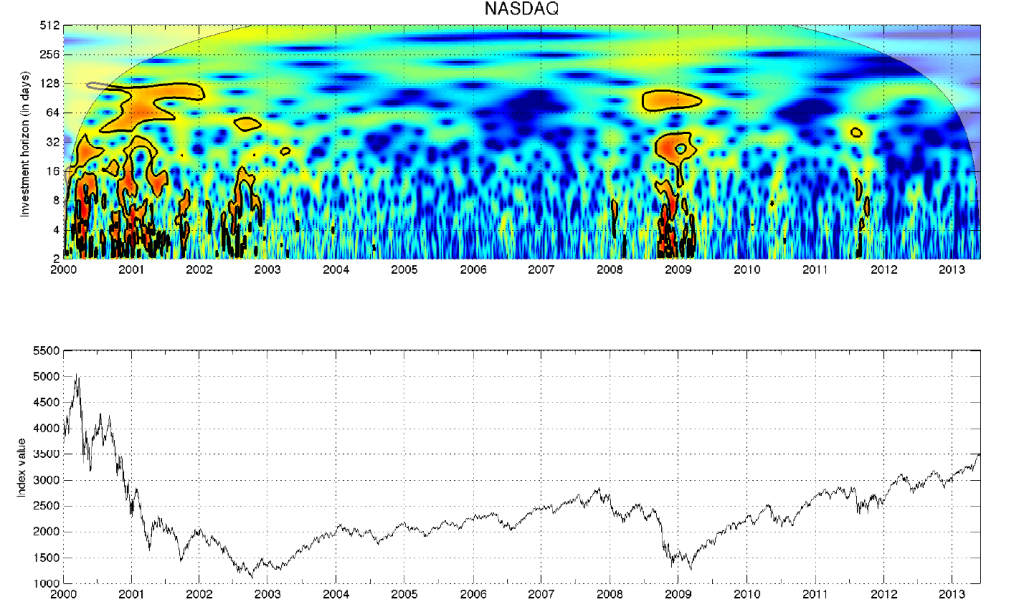Well, I have been doing a deep dive into financial modeling, but I want to get back to blogging more often. It gets in your blood, and really helps explore complex ideas.
So- one coming attraction here is going to be deeper discussion of the fractal market hypothesis.
Ladislav Kristoufek writes in a fascinating analysis (Fractal Markets Hypothesis and the Global Financial Crisis:Scaling, Investment Horizons and Liquidity) that,
“..it is known that capital markets comprise of various investors with very different investment horizons { from algorithmically-based market makers with the investment horizon of fractions of a second, through noise traders with the horizon of several minutes, technical traders with the horizons of days and weeks, and fundamental analysts with the monthly horizons to pension funds with the horizons of several years. For each of these groups, the information has different value and is treated variously. Moreover, each group has its own trading rules and strategies, while for one group the information can mean severe losses, for the other, it can be taken a profitable opportunity.”
The mathematician and discoverer of fractals Mandelbrot and investor Peters started the ball rolling, but the idea maybe seemed like a fad of the 1980’s and 1990s.
But, more and more, new work in this area (as well as my personal research) points to the fact that the fractal market hypothesis is vitally important.
Forget chaos theory, but do notice the power laws.
The latest fractal market research is rich in mathematics – especially wavelets, which figure in forecasting, but which I have not spent much time discussing here.
There is some beautiful stuff produced in connection with wavelet analysis.
For example, here is a construction from a wavelet analysis of the NASDAQ from another paper by Kristoufek
The idea is that around 2008, for example, investing horizons collapsed, with long term traders exiting and trading becoming more and more short term. This is associated with problems of liquidity – a concept in the fractal market hypothesis, but almost completely absent from many versions of the so-called “efficient market hypothesis.”
Now, maybe like some physicists, I am open to the discovery of deep keys to phenomena which open doors of interpretation across broad areas of life.
Another coming attraction will be further discussion of forward information on turning points in markets and the business cycle generally.
The current economic expansion is growing long in tooth, pushing towards the upper historically observed lengths of business expansions in the United States.
The basic facts are there for anyone to notice, and almost sound like a litany of complaints about how the last crisis in 2008-2009 was mishandled. But China is decelerating, and the emerging economies do not seem positioned to make up the global growth gap, as in 2008-2009. Interest rates still bounce along the zero bound. With signs of deteriorating markets and employment conditions, the Fed may never find the right time to raise short term rates – or if they plunge ahead will garner virulent outcry. Financial institutions are even larger and more concentrated now than before 2008, so “too big to fail” can be a future theme again.
What is the best panel of financial and macroeconomic data to watch the developments in the business cycle now?
So those are a couple of topics to be discussed in posts here in the future.
And, of course, politics, including geopolitics will probably intervene at various points.
Initially, I started this blog to explore issues I encountered in real-time business forecasting.
But I have wide-ranging interests – being more of a fox than a hedgehog in terms of Nate Silver’s intellectual classification.
I’m a hybrid in terms of my skill set. I’m seriously interested in mathematics and things mathematical. I maybe have a knack for picking through long mathematical arguments to grab the key points. I had a moment of apparent prodigy late in my undergrad college career, when I took graduate math courses and got straight A’s and even A+ scores on final exams and the like.
Mathematics is time consuming, and I’ve broadened my interests into economics and global developments, working around 2002-2005 partly in China.
As a trivia note, my parents were immigrants to the US from Great Britain , where their families were in some respects connected to the British Empire that more or less vanished after World War II and, in my father’s case, to the Bank of England. But I grew up in what is known as “the West” (Colorado, not California, interestingly), where I became a sort of British cowboy and subsequently, hopefully, have continued to mature in terms of attitudes and understanding.

